18 July OS 2017: Monday of the Ninth Week of St. Matthew; St. Emilian, Martyr
In today’s reading from the Holy Gospel, the Lord states the penalty for defiling the innocence of children:
At the same time came the disciples unto Jesus, saying, Who is the greatest in the kingdom of heaven? And Jesus called a little child unto him, and set him in the midst of them, And said, Verily I say unto you, Except ye be converted, and become as little children, ye shall not enter into the kingdom of heaven. Whosoever therefore shall humble himself as this little child, the same is greatest in the kingdom of heaven. And whoso shall receive one such little child in my name receiveth me. But whoso shall offend one of these little ones which believe in me, it were better for him that a millstone were hanged about his neck, and that he were drowned in the depth of the sea. Woe unto the world because of offences! for it must needs be that offences come; but woe to that man by whom the offence cometh! Wherefore if thy hand or thy foot offend thee, cut them off, and cast them from thee: it is better for thee to enter into life halt or maimed, rather than having two hands or two feet to be cast into everlasting fire. And if thine eye offend thee, pluck it out, and cast it from thee: it is better for thee to enter into life with one eye, rather than having two eyes to be cast into hell fire. Take heed that ye despise not one of these little ones; for I say unto you, That in heaven their angels do always behold the face of my Father which is in heaven. For the Son of man is come to save that which was lost. – Matthew 18: 1-11
I emphatically recommend the careful study of The Path to Salvation by St. Theophan the Recluse. It may be difficult – extremely difficult – to carry out the concrete program for spiritual life he details in the latter part of the book. One has to glean that which one can and put it to use. But the English translation of the book does something essential for us – perhaps uniquely so in English language Orthodox literature – because the earlier chapters describe precisely the right way to rear children, the psychological and spiritual process by which adolescents and college-age students fall away from the Faith, and the path of return after one has fallen away.
The willful refusal of contemporary parents, including churchgoing Orthodox Christians, to combat the influences destroying their children is astounding. It provides prima facie evidence that we have passed beyond the post-Christian age to the post-human age, a time in which those in power have succeeded in destroying ordinary human instincts and reactions in a critical mass of the people. Those who still have these instincts constitute a dwindling race of human beings living in the midst of a growing zombie population.
One looks over one’s shoulder and wonders, “Who is next?” Which friend or neighbor whom one values as a fellow Christian – or at least a normal person – will say, “Our son told us he is ‘gay,’ and, well (sigh, simper, melting phony-pious lovey-look), we don’t like it, but we just f-e-e-l that we need to support his choices,” or “Our daughter threatened to move out and live with her boyfriend, and we invited them to live with us and we’ll give them their own bedroom [next to the younger daughter’s bedroom, perhaps], because that way we can influence them…” or “We know this soccer league has Sunday morning games, but… [fill in the blank].”
Judgment is at the door for the hierarchs and clergy who just f-e-e-l they need to support such “choices,” as well as for the parents who make them. Since such blatant nonsense evinces a total loss of reason and common sense, one starts to wonder if repentance is even possible, not because God is unwilling to receive the sinner, but because a formerly rational person who has made himself into an idiot is highly unlikely to recover his senses. When people poke their own eyes out, “how great is the darkness.”
It is later than we think.

